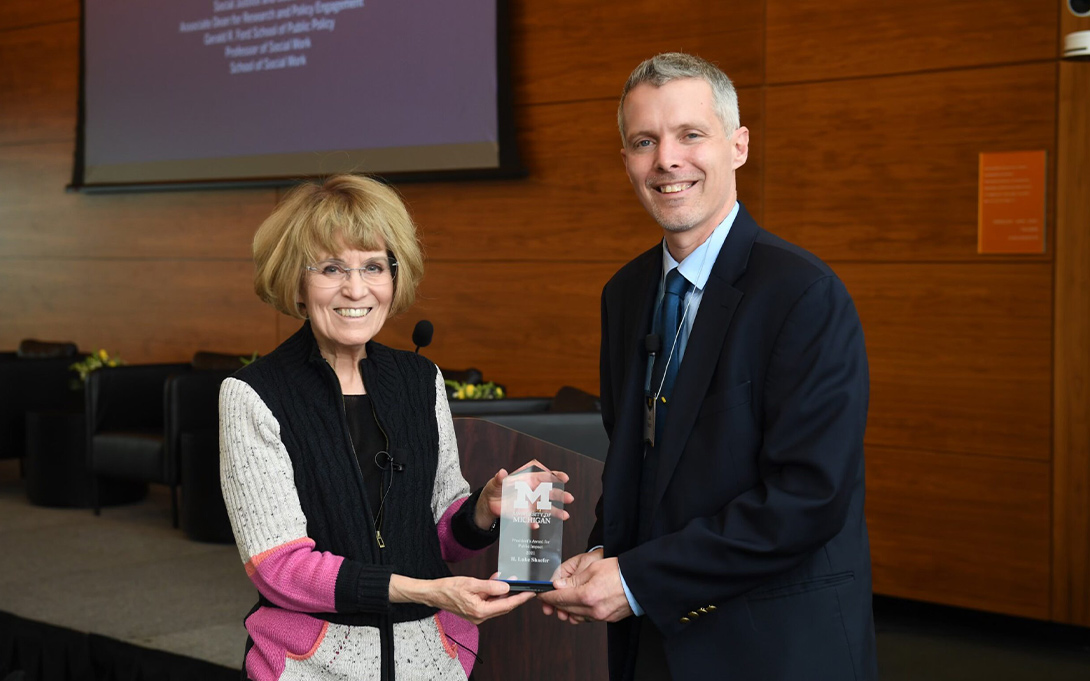
After receiving the President’s Award for Public Impact in February, Associate Dean Luke Shaefer was recognized at an in-person ceremony for his impressive work on the expanded Child Tax Credit.
U-M President Mary Sue Coleman led the ceremony and acknowledged how Shaefer met the moment.
“The challenges faced by impoverished families were never more apparent than when the pandemic struck and people lost their jobs,” Coleman said. “That loss of income was devastating to families already struggling to get by. The expanded Child Tax Credit passed by Congress genuinely saved lives by giving families the support they needed to put food on the table and keep the lights on.”
She continued, highlighting Shaefer’s extensive research and advocacy to eradicate poverty in the U.S.
Luke’s research and advocacy were integral to the tax credit and exemplified the importance of translating research into impact.
U-M President Mary Sue Coleman
“Luke’s research and advocacy were integral to the tax credit and exemplified the importance of translating research into impact. He has advised leaders at all government levels and has managed to write an award-winning and heartbreaking book about Americans living in poverty,” Coleman remarked. “Luke, we are so very proud and grateful for the work you do to shine a light on the most vulnerable members of our society. You shape public policy, improve lives, and exemplify the profound impact of Michigan faculty.”
Rebecca Cunningham, U-M vice president for research, also applauded Shaefer’s work, specifically his ability to collaborate.
“As a community, we cannot begin to solve the world’s greatest challenges if we simply operate in silos,” she said. “We have a responsibility to ensure that our collective knowledge and discoveries are translated in ways that positively benefit communities worldwide. That is why we are here today — to celebrate the tremendous societal and public impact generated by you and your colleagues.”
Shaefer had the opportunity to talk about his work at the ceremony.
“The federal government took a completely different approach this time around to the social safety net. And I like to think that I was a small part of that. The expansion of the Child Tax Credit was one idea I had been working on with colleagues for a number of years,” Shaefer said. “What happened is child poverty fell by 30 to 40% and hunger among families with kids plummeted by 30 to 40 %. There was no impact on labor market outcomes.”
While Congress and the president have allowed the expanded Child Tax Credit to expire, Shaefer is hopeful that it will be restored.
“We are right now at a crossroads, and all of the stuff I just talked about that went so well is in the rearview mirror. Congress and the president have to choose to act to bring some of that forward,” Shaefer continued. “The Child Tax Credit could be a thing that we did that, in one single swoop, cut child poverty by 30 or 40%. Or we could be a country that saw what worked and then decided we couldn’t make it happen in the long term. I’m not sure what direction we’re going, but right now, I’m actually still quite hopeful.”
Finally, Shaefer discussed the importance of collaboration and impact in his work.
“I believe, especially in my own domain of the social sciences, that we were really founded for the betterment of the human condition, and so this should be central to what we do. We should be driven by the interests and the needs of communities that we are embedded in,” Shaefer said. “It means a great deal to me to be at a university that has an award like this honoring public engagement. I think it really lifts up the importance of this kind of work.”
Read about and view the President’s Awards for Public Engagement Ceremony.
